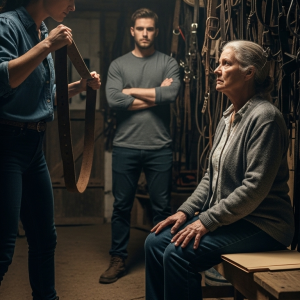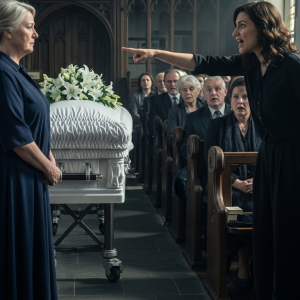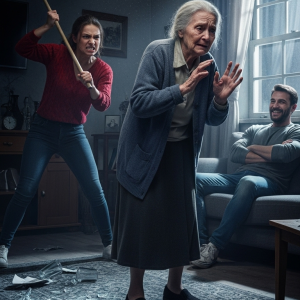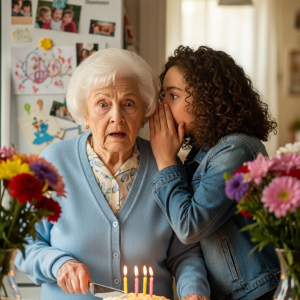The wind at Portland International had picked up fast that morning, grounding my flight and rerouting my weekend. I wasn’t supposed to be home until Sunday, but standing on my porch that Friday afternoon, suitcase in hand, I decided to turn the unexpected return into a quiet surprise. My son, Brendan, and his wife, Kayla, had offered to house-sit, saying it would be a calm space for them while their kitchen was under renovation.
I imagined them curled up on my couch, maybe a movie playing. But as I reached for my spare key, I heard voices from the kitchen window, which was cracked open just enough for the sound to carry on the damp air. It was Kayla’s voice, calm, almost sweet.
“I’ve already started putting the drops in her drinks. That should start showing symptoms in about a week or so.”
There was a long pause. Then I heard Brendan. “Do we really need all that?”
“She’s forgetful already,” Kayla replied, her tone practical, as if discussing a recipe. “But it has to be documented. Otherwise, we can’t get full guardianship.”
My hand clenched around the key. My body felt rooted to the porch, ice spreading through my fingertips. Drops in my drinks. Guardianship. I stood there in the soft drizzle, staring at the front door of the home I had shared with my late husband for thirty years. In that moment, it felt like a stranger’s house.
If you’ve ever returned to a place seeking comfort, only to find it has turned on you, you’ll understand. I swallowed hard, forced a breath, and slowly straightened up. Then, I unlocked the door, a serene smile fixed on my face, and stepped inside as if I hadn’t heard a thing. The performance had begun.
The moment I stepped inside, Kayla turned from the kitchen island with a startled smile. Brendan stood stiffly near the fridge. They hadn’t expected me; that much was clear. I dropped my keys into the bowl by the door, just as I always did. “Flight got canceled,” I announced, my voice a study in casual warmth. “Surprise!”
Kayla rushed over with open arms. Her perfume was citrus and powder—clean, controlled. I leaned into her hug, a strange coldness washing over me as I held the woman who had just been planning to dismantle my life.
She offered me a glass of warm milk, saying it would help with the travel stress. I took the glass, the warmth seeping into my hand. I raised it to my lips and let a small sip coat my tongue. It tasted faintly floral, not unpleasant, just… off. I smiled again, the careful smile I had perfected since Brendan had started looking at me with a hard distance in his eyes. “Thank you, sweetheart. That’s just what I needed.”
We sat down together. I answered their polite questions slowly, letting my words hang in the air. I deliberately mixed up my neighbor’s name with my old cat’s. I paused mid-sentence, pretending to lose my train of thought. I saw their eyes flicker toward each other—a quick, subtle exchange. They were taking notes.
Later that night, Kayla brought me a tray with cookies and another cup of tea. “I’m glad you’re back early,” she said. “You should rest. Let us help around the house.” I nodded. When she left, I placed the untouched cup on the mantelpiece. This was not the house I had left, and I was not the woman they remembered. I stared out the window, not in fear, but with a new, sharp focus.
By morning, the house had settled into a rhythm that felt like surveillance. Kayla hovered with a constant, casual concern. I moved through the kitchen slowly, fumbling with the kettle, slurring my words slightly.
Once she stepped into the backyard to take a call, I moved quickly. From a side cabinet, I retrieved a small, dusty voice recorder I hadn’t touched in years. I pocketed it and returned to the table. When Kayla came back in, I looked at her with a vacant expression. “Did I take my blood pressure pills already?”
She smiled. “Yes, dear. Just half an hour ago.” I nodded as if trying to grasp a fading memory.
Later, I left my phone on the hallway table with a fake calendar alert set to go off: Neurology Consult – Dr. Edelson. While I was on the porch, Kayla picked it up, saw the alert, and placed it back exactly where she found it.
That night, I slipped the recorder under the cushion of my armchair and left it running while I pretended to doze off in front of the TV. Their whispers filled the recording.
Brendan: “She’s slipping. Did you hear her today?”
Kayla: “It’s happening faster than I expected. The doctor will back us up if we get the paperwork ready.”
The words settled in my chest like sediment. I labeled a manila folder, tucked the recorder inside with a sticky note that read “Day One,” and hid it behind the books in my office. They were building their case. I was building mine.
It was a quiet Sunday morning when I found Brendan sitting alone on the back porch, a cup of coffee growing cold in his hand. I sat across from him, letting the silence stretch. “Your father used to sit here every morning,” I said gently. “He always thought you’d take over the garden. Said you had the hands for it. Quiet strength, he called it.”
Brendan let out a sharp breath. “He always had something to say about what I wasn’t,” he muttered. “Never what I was. When I dropped out of business school, he didn’t yell. He just looked disappointed. That was worse.”
His voice was filled with a deep, raw grief that had clearly never healed. “And when he died,” he continued, his shoulders slumping, “you handled everything. The house, the funeral, the money. No one asked me to do a thing. I felt like a guest at my own father’s service.”
I reached over and rested my hand on his. “You were never a guest, Brendan. You were just grieving in a way none of us understood. It’s not too late to be something different.” For a moment, he looked like a lost boy. But I knew his pain, while real, didn’t excuse his choices. He had chosen Kayla. He had chosen this plan. I kissed his temple and went inside. Behind my closed door, I wrote down every word, because understanding him didn’t mean trusting him. Compassion was not the same as permission.
On Monday morning, I called Sharon. We hadn’t spoken in years, but she had worked with elder advocacy groups for decades. She was composed, alert, and impossible to fool. We met at a quiet diner outside of town.
I slid a folder across the table. Inside were photocopies of Brendan’s emails to an unauthorized financial advisor, discussing “guardianship options” and “strategic asset control.” Next, I handed her a flash drive with the audio clips. Finally, I gave her a small, sterile vial containing the residue from one of Kayla’s “smoothies.”
Sharon sifted through the materials, her jaw set. When she looked up, her expression was grave. “Marion, you can’t stay there much longer without legal protection. You’re ahead of them, but they won’t hesitate to act fast if they feel cornered.”
I wasn’t ready to leave. There was more to do. Sharon took the evidence, promising to have the vial tested discreetly and to prepare an emergency contingency plan. I walked back to my car, the autumn wind sharp against my cheeks. That night, I taped an envelope beneath my nightstand drawer. Inside was a simple note with key contacts and one final sentence: If anything happens to me suddenly, none of this was an accident.
The next morning, with Kayla in the shower and Brendan out, I unlocked the drawer in my study. Inside were the original trust documents I’d signed with my late husband, Henry, two years before he passed. There was also a revised version, notarized six months ago, which named a different financial executor and bypassed Brendan entirely.
Next to it was the true power of attorney, already filed with our credit union, giving authority not to Brendan, but to our longtime advisor, Cheryl Kim. Henry’s trust in me was inked into every page. He had known, even then, that I might need to be protected.
I met Cheryl that afternoon. She confirmed everything remained secure. No changes had been made. Brendan’s name was nowhere near any decision-making authority. I gave her a USB drive with key evidence to be stored off-site.
When I returned home, the house felt different. Brendan and Kayla were in the kitchen, preparing a comfort meal of garlic and rosemary. As we sat at the table, Brendan casually brought up consolidating household accounts. I smiled gently and excused myself. The cracks were forming, and they didn’t yet know they were standing on ground that I had already shifted beneath their feet.
By Thursday, I knew the performance needed to reach its peak. I had to make them feel the urgency. I put on my cardigan backward, left my hair tangled, and walked into the living room holding a spatula, claiming I was looking for my toothbrush. I watered the fake orchid in the backyard, speaking to it like an old friend.
That night, I “forgot” about the soup simmering on the stove. It burned, filling the house with smoke. Brendan came down, his frustration palpable. I stood near the sink, humming an off-key tune, and said I thought the dog was barking. We hadn’t owned a dog in twenty years.
When Kayla found me tracing my finger along Brendan’s baby picture and whispering the wrong name, she quietly sent him a text. I saw it. They were ready. The next day, after I accepted another smoothie and poured it into a houseplant, the recorder in my pocket captured Kayla saying, “She thinks I’m doing her a favor with those drinks.” I filed that away carefully. They believed it now. They were certain they were right.
It was a Tuesday morning when Brendan placed the manila folder on the kitchen table. “It’s time we got some things in order,” he said. I took the folder upstairs, my hands trembling just enough for him to notice.
Inside were a durable power of attorney and a financial guardianship request, with highlighted sections for my signature. A sticky note from Brendan read: Get Mom’s signature by this week. Lawyer needs it for final filing.
There was no hesitation left in me. I photographed every page, sealed the original documents in an envelope, and hid them. I met Sharon after hours. She read through the papers, her jaw tightening. “If you had signed these,” she said, her voice grave, “you would have been giving him control over everything. Your assets, your medical decisions, even the house.”
I handed her the backup drive. She said she’d contact Elder Protective Services in the morning. That night, Brendan asked if I’d looked at the paperwork. I told him I was thinking about it. His voice was too smooth, too casual. The worst part wasn’t the betrayal; it was how calmly they had prepared to erase me.
At dawn, I met Sharon at her office. With quiet urgency, she began a formal submission to the state elder protection portal: audio files, transcripts, scanned paperwork, all classified as “suspected financial coercion.” Then, she drafted a formal cease and desist warning to be sent to Brendan and Kayla.
Before I left, she handed me a sealed white envelope. “This,” she said, “is our final layer.”
I placed that envelope on the mantel in plain view. Inside was a notarized affidavit listing every suspicious event, backed by timestamps and recordings. It wasn’t just a document; it was a boundary.
I kept up the act for two more days. I shuffled, let Kayla guide me, pretended to forget my own bank PIN. Then, on the third night, the envelope vanished from the mantel. Someone had opened it.
I heard a sharp rustle from the living room, then Kayla’s voice, rising and breaking. She stormed into the laundry room where I was folding towels, the torn envelope crumpled in her trembling hand. Brendan followed, his face pale.
“You think you’re clever?” she hissed. “You think this is going to scare us off?”
I said nothing. She turned to Brendan, waiting for him to speak, but he just stood there, his shoulders curled in like a boy being scolded. He was beginning to see that the game had changed.
He finally looked at me, his eyes narrowed. “You were never going to give it to us,” he said, the words cracking something open. “Not the house, not the money. You always planned to cut us out.”
I stepped closer, my voice steady. “No, Brendan. I never planned to cut you out. I just stopped pretending you were the kind of people I could trust.”
Kayla scoffed and walked out. Brendan stayed. I walked to the mantel and picked up a photo of us from ten years ago. “I never forgot you,” I said softly. “But somewhere along the way, I think I forgot myself.” He didn’t speak again. The air in the room had grown too heavy to hold.
A week after Brendan and Kayla left, the house settled into a quiet I had forgotten existed. There was no note, no apology, just an emptied closet and a front door that didn’t close quite right.
A silver SUV pulled into the driveway. Three young women with clipboards stepped out, their jackets bearing the crest of the university medical center. They had come on behalf of the Ellsworth Fund for Elder Justice—my late husband’s name, now tied to something that mattered.
The young woman with dark curls handed me a folder, thanking me for funding their first round of training sessions, for making room for stories like mine. She didn’t know the whole story, but she knew enough.
Brendan would not inherit the estate. I had transferred everything—the house, the savings, the investments—into the fund six months prior. Quietly, legally, intentionally. He thought he was playing a game of strategy, but I had stopped playing long ago.
My story now had a new home. Not in courtrooms or headlines, but in the hands of the next generation—in whispered warnings and in stronger women with clearer eyes.
I sat on my porch, a blanket around my shoulders. The sun was low, the air smelled of rosemary. I wasn’t waiting for anything anymore. I was simply present.
Sometimes justice doesn’t come with a bang. It comes with a whisper, a boundary drawn, and a legacy redefined. My story was no longer about what was taken from me, but about what I chose to build in its place. And that was a foundation no one could ever shake.




